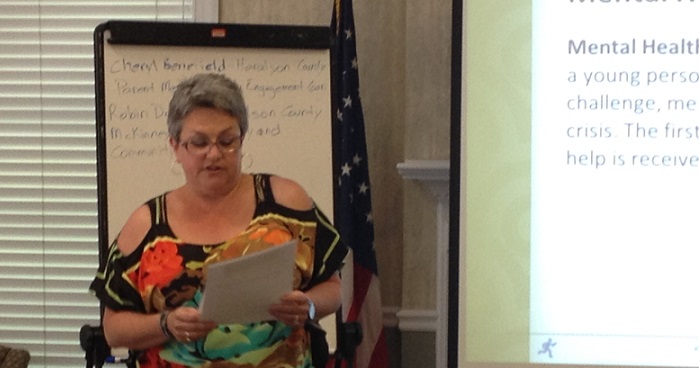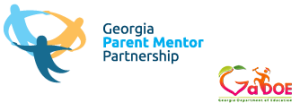
Life Experience Becomes a Calling

By Jane Grillo
Lived experience – that is what makes Georgia Parent Mentors experts in the family engagement work they do with parents, school staff and out in the community. Every parent mentor brings years of on the job training because they have worked 24/7 at home with their own child with a disability. What is unique about the Georgia Parent Mentor Partnership as a collective group is that our mentor’s expertise is as varied as our children’s disabilities.
One of our resident experts, Cheryl Benefield, who served as Parent Mentor in Haralson County until 2015, when she took a job with the Ga. Dept. of Ed, specializes in behavioral health and substance abuse issues. Because of her experience the National Council for Behavioral Health recognized her skills and selected her to be a Quality Evaluator for Youth Mental Health First Aid (YMHFA).
“Having been an educator for 23 years, I’ve worked with a number of students and families who were dealing with mental and behavioral health issues as well as substance abuse, so it has always been important to me. It became a driving force in my life and career when my son was hospitalized and diagnosed with major depressive disorder and suicidal ideations, “ she said.
“I thought that I knew the answers and could navigate the systems – both education and mental health – because I’d been doing it for so long. When I found out first hand, as a parent, how difficult that journey is both for the young person and the family – everything changed,” she said.
The challenges she was facing with her son’s illness and recovery and her realization that she needed more tools for her son led her to YMHFA. “Youth Mental Health First Aid is primarily designed for adults who regularly interact with young people, to teach parents, family members, caregivers, teachers, school staff, peers, neighbors, health and human services workers, and other caring citizens how to help an adolescent (age 12-18) who is experiencing a mental health or addictions challenge or is in crisis,” Benefield explained.
Benefield, who has been a trainer since 2012, said that this program is important because, “Our kids are important – every one of them. It’s important because mental and behavioral health disorders and substance abuse are real factors for young people but it can be hard for us to know the difference between typical adolescent behaviors and symptoms. It’s important because you may be that one person who listens and is able to help.”
“Parent Mentors already understand how to take their lived experience and use it to help other parents. That’s what we train from with Youth Mental Health First Aid. That is why parent mentors are a good fit,” she said. In the last two years, since she first presented this program to the GaPMP, she has trained about 20 percent of parent mentors around the state.
She is working to train people who work with youth, (not just parent mentors,) so, “we can help people become more aware. YMHFA teaches people to recognize there is more to this than a kid just being a ‘weird kid’. We need to erase the stigma. “YMHFA is like First Aid – it makes you more prepared to help someone who is in crisis or exhibiting symptoms. You’re not asked or expected to diagnose or treat any mental or behavioral health disorder but to be that person who recognizes that this is a youth who’s struggling. Just like the ABCs of First Aid, you’re there to provide immediate support and, perhaps most importantly, to listen. Sometimes things that look like just being a teenager are symptomatic of other issues and vice versa – sometimes what looks like a mental health disorder is typical adolescent development. YMHFA doesn’t ask us to make that determination but to listen and to encourage that young person to reach out for help, support, and professional services if appropriate,” she said.
“That is why a lot of what I do is working with communities as well as families,” she explained. YMHFA is focused on a 5 step process, ALGEE:
- A–Assess for risk of suicide or harm
- L–Listen nonjudgmentally
- G–Give reassurance and information
- E–Encourage appropriate professional help
- E–Encourage self-help and other support strategies
Trainings typically take a full day or are sometimes split into two days. To find a training go to: http://www.mentalhealthfirstaid.org/cs/about/ and click on the links to “Find a Course”.
She explains her dedication to YMHFA this way: “One of my favorite quotes is from Martin Luther King, Jr. – ‘Life’s most persistent and urgent question is, ‘What are you doing for others?’ I truly believe that there is a reason for everything. Some of the most painful experiences in my life have been responsible for the biggest growth. If you have the opportunity to take those experiences and use them to help others, how can you not?”

 Learning Curve
Learning Curve